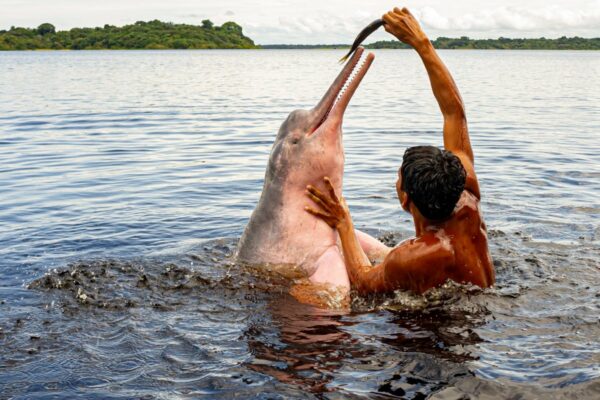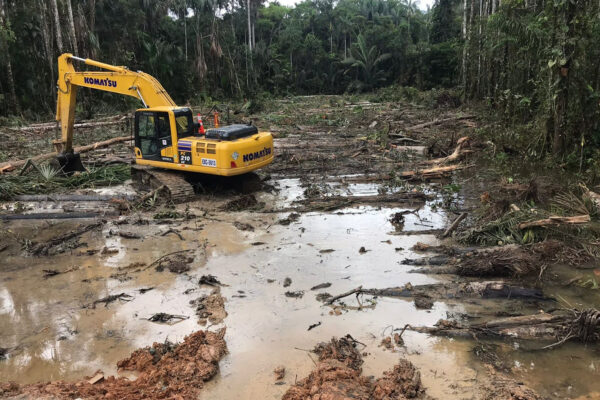Thursday, October 8, 2009
By: Actualidad Étnica
The U’wa indigenous community, that has opposed the exploitation of natural resources in their sacred and ancestral territory since 1995, announced that they will carry out a resistance action in Cubará, Boyacá on October 12 and 13. To be held concurrently with the national indigenous mobilization (“minga”), their action will show their opposition to Ecopetrol’s current activities in this zone as well as to other megaprojects that the national government plans to implement there.
“We reject any type of intervention in U’wa ancestral territory that contradicts our culture… We will not negotiate and we want to make clear that anything that happens to the U’wa people is the responsibility of the companies and the national government.” Under this decision of the U’wa authorities and communities, the U’wa have publicly reactivated their fight to defend their territory and collective rights.
The U’wa denounce the presence of megaprojects in their territory that the government has proposed to implement in the short, medium, and long term. One of them is Ecopetrol’s exploitation of gas at the Gibraltar 3 drilling well, located in a sacred place according to the U’wa cosmovision. Another involves the construction of a bi-national road that will connect Colombia and Venezuela that is projected to cross the heart of the indigenous reserve. The last big megaproject, which according to the community severely affects their territorial rights, is the proposition to advance ecotourism in the Cocuy National Park, which will result in the invasion and disrespect of their sacred ceremonial sites.
“Additionally we are worried that these megaprojects have attracted militarization and now we constantly see members of the army carrying weapons, walking through our reserve, and contaminating our sacred places with thoughts of war. And now we have for neighbors a mini-battalion that offers security to the oil company,” explains Berua, secretary of Asouwa, the association of traditional authorities and U’wa councils.
U’wa March of Resistance: October 12 and 13
For their mobilization, the U’wa selected the route that connects the departments of Arauca with Santander and Norte de Santander, specifically to include two points: La China and La Laguna, which are located approximately one hour from Cubará. It is predicted that about 2,000 U’wa from all of the communities will participate.
La China and La Laguna – part of ancestral U’wa territory – are where Ecopetrol has plans for new exploration. The U’wa position continues to be that the exploitation of any resource in their territory is not permitted, and they demand that the national government provide the reserve with security.
The Association of U’wa Traditional Authorities and Councils (Asouwa) specified in their communication about the march that through the mobilization they are looking to visualize three fundamental aspects, “reaffirm our position of no exploitation of any natural resource and no violation of our ancestral U’wa territories; fight for our own right that supports us as an indigenous community; and commemorate our history since the arrival of the conquistadors and the cultural change that ensued.”
Defending their Territory
The U’wa opposed the American multinational Occidental Petroleum Company, Oxy. In mid-1992 Oxy developed an association contract with Ecopetrol for the exploration and exploitation of hydrocarbons in the country. It was given an environmental license for a four hectare territory that had been the private property of Asouwa that was then violently taken by the company with the support of the Colombian police.
Once Oxy’s exploration activities culminated and they did not find the desired oil reserves, they signed over the rights of the environmental license to Ecopetrol. Since then the state-owned company has managed Gibraltar 1 and 2 and recently opened the Gibraltar 3 well, which is where they will extract condensed gas, a hydrocarbon more easily refined than oil. This implies a change in the natural resource exploited: gas instead of oil and the intervention of another new company Transoriente that will be in charge of the installation of a gas pipeline.
Since the arrival of the petroleum industry, the U’wa have tried through legal methods to avoid the exploration and exploitation of natural resources. Nevertheless they have not succeeded as hoped due to the fact that the exploitation does not occur within the legally constituted reserve, but rather in zones that the U’wa consider sacred territory for use, transit, and ancestral customs. This complicates the legal argument and visibility of the problem.
The presence of Ecopetrol has brought the militarization of the zone to provide security for the energy infrastructure in the country, and has reached the point at which two mini-battalions were created for the operations of the Special Energy Vial No. 5 Battalion that operates within U’wa sacred territory. “The military bases have closed in on the zone and have affected the circulation corridors of the U’wa for coming and going to their orchards and ranches,” mentions Tegría.
Cultural Considerations Facing the Affected Territory
The Cedeño village, where the Gibraltar wells are located, signifies the heart, the fundamental place to develop consciousness and communication. It is the place where the U’wa study how to cure diseases. The special significance is that it is the specific location for curing snake bites.
“The zone where the Gibraltar 3 well is found is like the heart of the earth. If they exploit it, the world will sicken. For not paying attention to nature, little by little humanity will disappear,” voiced Sirakubo Tegría, Asouwa president, in a communiqué sent to the national and international media.
Cocuy National Park
The park functions as an overlap, in other words a part of the park is located inside the U’wa reserve. The government proposes that the presence of both the government and the indigenous community can be formalized through the figure of “co-administration” and thereby strengthen ecotourism programs. The park project is supported by USAID.
The National Parks Division, under the coordination of the Ministry of Interior and Justice, has been advancing the process of the modification of Decree 622/77 since 2007, consulting with the indigenous populations, afro-Colombian communities, and others that inhabit or use (regularly or permanently) areas considered to be national parks. The legally constituted U’wa reserves that overlap with the park are: the United U’wa Reserve, Angosturas, Sibarita, Valles del Sol, and Laguna Tranquila.
The U’wa decided to not meet with the government because they do not want to negotiate their position, given that they do not agree with the promotion of tourism in sacred places. They already view mass tourism as a threat to the survival of their culture and above all to the conservation of the environment. During the last Holy Week, for example, some 1,000 tourists entered the park.
“When a natural park overlaps with indigenous territories, this makes the practice of the indigenous authorities’ government more difficult because they cannot exercise indigenous autonomy or the application of special jurisdiction,” affirmed Alberto Achito, Emberá indigenous leader, in his article Analysis, Conflicts, and Concepts of Natural Parks in Colombian Indigenous Territories.
Achito, who is also a member of the National Indigenous Organization of Colombia (ONIC), considers that in the case of indigenous territories overlapping with a natural park, there exists an incompatibility with respect to the control, management, and administration of the territory. Problems of competition arise between authorities-one elected by the community that is the indigenous council and the other that is imposed by the Ministry of the Environment as the Director of the park.
“What has occurred is that the person that makes the final decision about the uses and management of natural resources has been the administration of the park, specifically the director. As such, the indigenous authorities are pushed to a second tier such that there is not territorial autonomy. The indigenous government’s exercise of authority and is weakened because their decisions will always be entitled by the park,” stated Achito.
The superposition of natural parks and indigenous territories is a new concept to the indigenous communities in terms of their territorial autonomy. Furthermore, the indigenous authorities view the idea of “co-administration” suggested by the government as an action of westernization of indigenous thought, in which the communities have to adjust to what is defined by the National Parks Directorate.
Bi-national Road
The project plans to connect Colombia and Venezuela, and includes the construction of an international bridge over the Arauca River. “The road will pass through the heart of the U’wa reserve and seems to respond to one of the strategies of implementing the Initiative for the Regional Integration of South American Infrastructure (IIRSA),” said Sirakubo Tegría.
IIRSA is an initiative of 12 South American countries, the objective of which is to promote the development of transportation, energy, and communication infrastructure in the region. Nevertheless the U’wa state that up until now they have not received more information about this project.
“We are the expression of historic, patrimonial, and millennial rights, which is full proof of the legitimacy of our administrative, judicial, legislative, and political claims that we make on our lands and territories,” emphasizes the U’wa community as one of the principles of their campaign.













